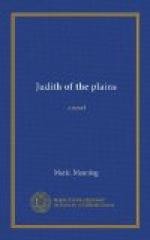Ignorant of the recent anticlimax, and with a burden of many heavy thoughts, Judith was penetrating a world of unleavened desolation. Beneath the scourge of the noon-day sun the desert lay, stripped of every illusion. Vegetation had almost ceased, nothing but sun-scorched, dust-choked sage-brush could spring from such sterility. The fruit of desolation, it gave back to desolation a quality more melancholy than utter barrenness. Glittering in the sunlight, the beds of alkali gleamed leper white; above them the agitated air was like the hot waves that dance and quiver about iron at white heat. From horizon to horizon the curse of God seemed to have fallen on the land; it was as if, cursing it, He had forgotten it, and left it as the abomination of desolation. Judith scarce heeded, her thoughts straying after first one then another of the group that made up her little world—Peter Hamilton, Kitty Colebrooke, Jim, his family—thoughts inconsequent as the dancing dust-devils that whirled over that infinity of space, and, whirling, disappeared and reappeared at some new corner of the compass.
The trail that she must take to Jim’s camp in the mountain was known to but few honest men. Fugitives from justice—the grave, impersonal justice of the law, or the swift justice of the plains—found there an asylum. And while they sometimes suffered, in death by thirst or hunger, a sentence more dreadful than the law of the land or the law of the rope would have given them, the desert, like the sea, seldom gave up her own. It was more than probable that no woman except Alida Rodney had ever taken that trail before, and reasonably certain that no woman had ever taken it alone. Dolly, when she saw the beds of alkali grow more frequent, and that the trails of the range cattle turned back, sniffed the lack of water in the air, slackened her pace, and turned an interrogatory ear towards her mistress.
“It’s all right, old girl”; the gauntleted hand patted the satin neck. “We’re in for”—Judith flung her head up and confronted the infinite desolation yawning to the sky-line—“God knows what.”
Dolly broke into a light canter; this evidently was not an occasion for dawdling. There was a touch of business about the way the reins were held that made the mare settle down to work. But her flying hoofs made little apparent progress against the space and silence of the desert. Five, ten, fifteen miles and the curving shoulder of the mountain, that she must cross, still mocked in the distance. Only the sun moved in that vast world of seemingly immutable forces.
There was no stoic Sioux in Judith now. The girl that breasted the crests of the foot-hills shrank in terror from the loneliness and the suggestion of foes lurking in ambush. The sun dropped behind the mountain, leaving a blood-red pool in his wake, like fugitive Cain. Already night was sweeping over the earth from mountain shadows that flowed imperceptibly together like blackened pools. To the girl following the trail the silence was more dreadful than a chorus of threatening voices. She listened till the stillness beat at her ears like the stamping of ten thousand hoofs, then pulled up her horse, and the desert was as still as the chamber of death.




